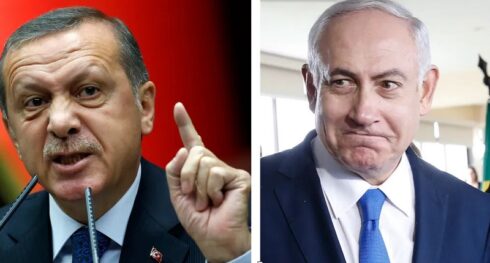Written by Uriel Araujo, PhD, anthropology researcher with a focus on international and ethnic conflicts
On the anniversary of the October 7 attacks, the Levant crisis is escalating into a Middle Eastern one. While Israel is intensifying its attacks against the Lebanese capital and Gaza (and also Syria and Yemen), Iran grounded all flights on Sunday – presumably as a precaution measure in anticipation of Israeli strikes. Last week, the Jewish state faced about 200 Iranian ballistic missiles, most of which either were intercepted or landed in the open. In any case, there has been some damage to Israeli infrastructure, plus 10 million Israelis had to seek cover – according to the Times of Israel. Amid Israel’s multi-fronted war, the role that will be played by Turkey remains unclear – so far, at least.
In the rhetoric and diplomatic realm, Ankara has been increasingly vocal about Tel Aviv’s actions. One can recall that, in August, Turkish President Recep Tayyip Erdogan said his country could intervene militarily in Israel’s war in Palestine. On September 30, the Turkish president, speaking at the United Nations General Assembly (UNGA) even compared Israeli leadership to Hitler, and called for an “international alliance of humanity” to stop Zionism. He added that the UN should recommend the use of force to stop Zionist aggression. More recently, Erdogan claimed (last week, while addressing the opening of parliament) that Tel Aviv’s next target could be Turkey.
On Saturday, the Turkish leader said, at an event near Istanbul, that “the only step that will stop Israeli arrogance, Israeli banditry, and Israeli state terrorism is the alliance of Islamic countries”, and repeated the claim that, not “content with occupying Gaza alone”, it was already eyeing Turkey.
The same day, Erdogan accused Tel Aviv of employing regional conflicts (in Palestine, Yemen, Lebanon, and Syria) as “merely an excuse” for territorial expansion: “The Israeli government comes up with new justifications daily to legitimize its occupation and invasion policies.” Moreover, he vowed to continue supporting Palestine and urged the Islamic world to take trade and financial measures against it, highlighting the fact that Turkey is the only state which has imposed economic sanctions on Israel, by halting trade (a total trade embargo has been in place since April).
Despite Erdogan’s boasting, his country still pragmatically maintains relations with Israel, as Ragip Soylu (Middle East Eye’s Turkey Bureau Chief, based in Ankara) highlights. Both countries’ diplomats still interact “on practical matters”, and “Turkish and Israeli intelligence agencies still talk to each other.” While “Israel backed off from plans to impose additional taxes on Turkish products”, trade goes on, with goods “being routed through third countries.”
It is quite unlikely Turkey will get militarily involved in a conflict with US-supported Israel – in the same way, the latter has no reason to attack the former. Turkey is, after all, a NATO member. Selin Nasi, a political scientist at the London School of Economics (LSE), puts it bluntly: “Attacking Turkey would mean confronting NATO and the US.”
As I wrote, Turkish attempts to project itself as a regional or even a world leader (as the “voice of humanity’s conscience”, in the words of its Foreign Ministry) are part of larger ambitions that have been described as a Neo-Ottomanist agenda. Such has always faced opposition in the Middle East and beyond. One may recall that as early as 2021, Gulf nations (with the exception of Qatar) thought of Ankara and Tehran (two rivals) as being themselves a larger threat to Arabs than Israel – with Turkey involved in a number of proxy wars with Arab states in North Africa.
Some analysts argue Turkey does not have that much leverage with Hamas. Huseyin Bagci, an international relations researcher based at Ankara’s Middle East Technical University, argues that “the Middle East Arab-Israeli conflict since 1948 has been an Arab-Israeli conflict, not a Turkish-Israeli conflict” and that “none of the Arab countries would like to get Turkey involved in this process.”
Despite being so eloquent against Israeli acts of aggression, Erdogan has been notably silent on the assassination of Hezbollah’s leadership – and this is no coincidence. Hezbollah is an Iranian-supported Shia militant group, and, according to Asli Aydintasbas, an expert on Turkey based at the Brookings Institution, “Hezbollah’s decapitation diminishes the influence of Turkey’s topmost regional rival, Iran, and is not something Turkey would cry over.”
In addition, Hezbollah and Iran both support the Syrian President Bashar al-Assad. One might remember that Ankara itself (together with its ally, the so-called Syrian National Army) has militarily occupied areas of Northern Syria. Thus, the Turkish are in fact illegal occupants in the Levant just like the Israelis, who occupy the Golan Heights, also in Syria. Thus, from a Levantine perspective, Turkish claims (of being a defender of Palestinians against aggression and occupation) can only be met with suspicion. Historically speaking, the Levantine peoples of Syria, Lebanon and Palestine have maintained strong cultural ties, and, moreover, it is quite impossible to talk about the issue of Palestine isolatedly, as Israel has also been in conflict with neighboring Lebanon and Syria.
The ongoing crisis in the Middle East, besides being a regional Arab-Israeli conflict, is also the escalation of the long going Iranian-Israeli “non-official war” – and Turkey is a regional rival of the Iranian republic, which further complicated an already complex equation. It can only play a kind of double game. In any case, Turkish rhetoric on the matter should be taken with a grain of salt.
MORE ON THE TOPIC:






